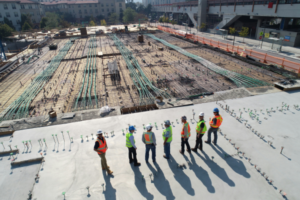Understanding the Need for Specialized Accounting Software in Construction
The construction industry is unique in its financial management requirements, making specialized accounting software an essential tool for success. Understanding the need for such software is crucial for construction companies to effectively manage their finances and streamline their operations.
One of the primary reasons why specialized accounting software is necessary in construction is the complexity of project finances. Construction projects involve multiple components, such as labor costs, material expenses, subcontractor payments, equipment rentals, and more. Keeping track of all these costs manually can be time-consuming, error-prone, and prone to oversights. Specialized accounting software provides a centralized platform to manage and track these various financial elements efficiently.
Accuracy is paramount in construction accounting. With large budgets and tight profit margins, even minor errors can have significant consequences. Specialized accounting software offers features and functionalities specifically designed to ensure accuracy in financial calculations, budgeting, and forecasting. This reduces the risk of errors, provides greater financial transparency, and enables more informed decision-making.
Construction projects often involve complex billing and invoicing processes. This can include progress billing, milestone billing, and retention payments. Specialized accounting software can automate these processes, ensuring accurate and timely billing while maintaining compliance with contractual obligations.
In addition to managing project finances, construction companies must also comply with industry-specific regulations and tax requirements. Specialized accounting software caters to these specific needs, incorporating features such as prevailing wage tracking, certified payroll reporting, and tax calculation functionalities. This helps construction companies ensure compliance with regulatory standards and streamline their reporting processes.
Another critical aspect of construction accounting is the need for real-time visibility into project financials. Construction projects are dynamic, with costs, expenses, and revenues constantly changing. Specialized accounting software provides up-to-date financial information, allowing project managers and stakeholders to monitor project financials in real-time. This visibility enables proactive decision-making, early identification of potential issues, and effective cost control.
Collaboration is essential in construction projects, particularly when it comes to financial management. Specialized accounting software enables seamless collaboration between different teams and stakeholders involved in a project. This includes project managers, accountants, subcontractors, and suppliers. By providing a centralized platform for communication and data sharing, construction accounting software fosters efficiency, reduces communication gaps, and enhances project coordination.
In summary, specialized accounting software is crucial for construction companies due to the unique financial management requirements of the industry. It enables accurate financial tracking, automates complex billing processes, ensures regulatory compliance, provides real-time visibility into project finances, and facilitates collaboration among project stakeholders. By investing in specialized accounting software, construction companies can effectively streamline their financial operations, improve accuracy, and enhance overall project performance.
Key Features to Look for in Construction Accounting Software
When selecting construction accounting software, it is crucial to consider a range of key features that meet the unique needs of the industry. These features will ensure that the software effectively supports financial management and operations within construction projects. Here are some essential features to look for when evaluating construction accounting software options:
1. Project Management Tools
Construction projects involve multiple tasks, resources, and stakeholders. Look for software that offers robust project management capabilities. This includes features such as project tracking, scheduling, document management, change order management, and collaboration tools. Effective project management functionality ensures smooth coordination between financial processes and project execution, resulting in improved efficiency and timely project completion.
2. Cost Estimation and Control
Accurate cost estimation is critical in construction projects. Look for software that provides comprehensive cost estimation tools, allowing you to create detailed and accurate project budgets. The software should enable you to track actual costs against estimated costs, identify cost variances, and implement effective cost control measures. This feature ensures that projects stay within budget and helps prevent cost overruns.
3. Payroll and Human Resources Integration
Construction projects require managing a diverse workforce, including employees, subcontractors, and temporary workers. Look for software that seamlessly integrates payroll and human resources functionalities. This allows for efficient management of payroll processing, employee time tracking, wage rates, benefits administration, and compliance with labor laws. Integration with HR ensures accurate employee management and simplifies payroll processes, saving time and reducing errors.
4. Inventory Management
Construction projects often involve managing a wide range of materials, equipment, and supplies. Look for software that provides robust inventory management capabilities. This includes features such as tracking inventory levels, managing stock movements, generating purchase orders, and integrating with suppliers. Effective inventory management ensures that materials and equipment are readily available when needed, minimizing project delays and optimizing resource allocation.
5. Financial Reporting and Analysis
Comprehensive financial reporting and analysis capabilities are essential for construction companies. Look for software that allows you to generate detailed financial reports, including income statements, balance sheets, cash flow statements, and job cost reports. The software should also facilitate data analysis, enabling you to gain insights into project profitability, identify financial trends, and make informed business decisions. Advanced reporting and analysis functionalities provide transparency into project finances and support strategic planning.
In addition to these key features, consider the scalability and flexibility of the software, its compatibility with other systems and software used in your organization, user-friendliness, and customer support provided by the software vendor. Evaluating construction accounting software based on these key features will help you choose a solution that aligns with your specific business requirements and enhances financial management within your construction projects.
Implementing Accounting Software in Your Construction Project
Implementing accounting software in a construction project requires careful planning and execution to ensure a smooth transition and effective utilization of the software. Here are the key steps to consider when implementing accounting software in your construction project:
1. Steps for Implementation
a. Define Objectives: Clearly outline your goals and objectives for implementing the accounting software. Identify the specific financial management challenges you aim to address and the desired outcomes you expect from the software.
b. Conduct Needs Assessment: Assess your current financial management processes and workflows to identify areas that can be improved through the use of software. Determine the specific functionalities and features required to meet your project’s needs.
c. Research and Select Software: Conduct thorough research to identify accounting software options that align with your project requirements. Evaluate the features, scalability, compatibility, and customer support of each software. Select the software that best suits your needs and budget.
d. Customize and Configure: Work closely with the software vendor to customize and configure the software according to your project’s specific requirements. Set up chart of accounts, define cost codes, and establish project templates to ensure accurate financial tracking.
e. Data Migration: If you are transitioning from an existing accounting system, plan and execute the migration of your data to the new software. Ensure that all relevant financial data, including historical records, are accurately transferred to the new system.
f. Test and Validate: Conduct thorough testing to ensure that the software is functioning correctly and meeting your project’s needs. Validate the accuracy of financial calculations, reporting functionalities, and integration with other systems.
2. Training for Staff
Accounting software implementation requires training for your project team members who will be using the software. Provide comprehensive training sessions to familiarize them with the software’s features, functionalities, and workflows. Ensure that they understand how to enter financial data, generate reports, and utilize the software effectively. Consider providing ongoing training and support to address any questions or issues that may arise during the implementation process.
3. Evaluating the Effectiveness of the Software
Regularly evaluate the effectiveness of the accounting software in meeting your project’s financial management objectives. Monitor key performance indicators (KPIs) such as accuracy of financial data, timeliness of reporting, efficiency in cost control, and overall user satisfaction. Gather feedback from users and stakeholders to identify areas for improvement and address any challenges or issues that may arise.
By following these steps, you can successfully implement accounting software in your construction project. A well-executed implementation process will streamline your financial management processes, enhance accuracy and efficiency, and contribute to the overall success of your construction project.
Future Trends in Construction Accounting Software
As technology continues to evolve, construction accounting software is also advancing to meet the changing needs of the industry. Here are some future trends to watch out for in construction accounting software:
1. Integration with Emerging Technologies
Construction accounting software is expected to integrate with emerging technologies such as artificial intelligence (AI), machine learning (ML), and Internet of Things (IoT). AI and ML algorithms can assist in automating tasks, analyzing data, and providing predictive insights. IoT devices can capture real-time data from construction sites, enabling seamless integration with accounting software for accurate cost tracking and analysis.
2. Cloud-based Solutions
Cloud-based construction accounting software offers numerous benefits, including enhanced accessibility, scalability, and data security. With cloud-based solutions, construction companies can access their accounting software from anywhere, collaborate in real-time, and seamlessly integrate with other cloud-based systems. The cloud also facilitates automatic software updates, ensuring that companies have access to the latest features and functionalities.
3. Mobile Accessibility
Mobile accessibility is becoming increasingly important in the construction industry. Construction professionals often work on-site and require instant access to financial data. Future construction accounting software is expected to provide mobile applications that allow users to access critical financial information, capture expenses, enter time and materials, and generate reports directly from their mobile devices. This enhances productivity, enables real-time decision-making, and improves overall project efficiency.
4. Advanced Data Analytics
Data analytics and reporting capabilities will continue to evolve in construction accounting software. Advanced data analytics tools can help construction companies gain deeper insights into project financials, identify trends, and make data-driven decisions. Predictive analytics can provide early warnings of potential cost overruns or delays, enabling proactive measures to mitigate risks.
5. Enhanced Collaboration and Communication
Future construction accounting software will focus on improving collaboration and communication among project stakeholders. Integrated communication tools within the software will enable real-time collaboration, allowing teams to discuss financial matters, resolve issues, and share information seamlessly. This will enhance transparency, streamline workflows, and facilitate effective decision-making.
By embracing these future trends in construction accounting software, construction companies can stay ahead of the curve and optimize their financial management processes. Investing in software that incorporates emerging technologies, offers cloud-based solutions, provides mobile accessibility, leverages advanced data analytics, and enhances collaboration will ultimately contribute to improved project outcomes and increased profitability.




